[Translation] Differences in the development of BlackBerry and Android
From the translator: this text should help commentators from this and this topic, wishing to learn how things are going with the development for BlackBerry 10.
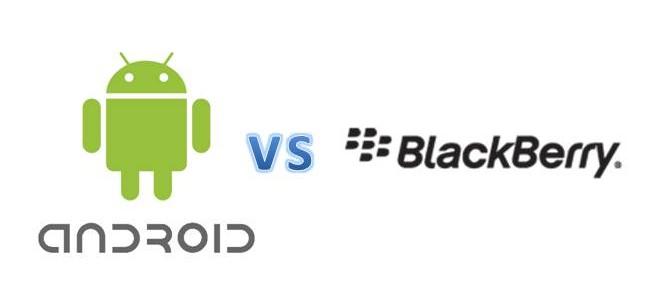
I want to share with you my own development experience for Android and BlackBerry. It will be not only about programming, but also about the analysis of statistics and profits.
')
I in no way want to judge the platforms, just sharing my impressions and facts.
About me
In order to better present the situation, I will briefly tell you about myself: I am 20 years old, I live in the city of Potsdam, Germany. At the moment I am studying at the Hasso Plattner Institute with a degree in Systems Engineering. I’m interested in Android development since 2011, and in 2012, BlackBerry was added to the list. That's when I started my own business. My main projects for BlackBerry are bb10bars.net and BB10 Sideloading Tool .
Comparison
As a basis for comparison, I will take my own Remote Control Collection application. This program for Android exists since November 2011. At the moment, it contains more features than the version for BlackBerry, so I will not use the most current version and statistics on it.
The Remote Control Collection for BlackBerry is a “native” application written using the Cascades framework, following all the guidelines of the Built for BlackBerry program. It is available from March 2013 and provides much better performance than the Android version. Prior to launching the BB10, the application was also available for the PlayBook tablet as an Android port.
Development
The first steps in programming for Android were pretty easy. Up to this point, I did not know Java, and I was not particularly familiar with Eclipse. A huge number of examples with source code allowed me to use almost any opportunity for my development. In the event of a problem, dozens of developers have already managed to discuss and solve it on StackOverflow before me.
When I started programming for BB10 using the first versions of the SDK and the DevAlpha device, I was aware that I could not count on a large amount of resources on this subject, as well as the developer community. The beta versions of the development environment were quite difficult to get to work correctly and most of the problems I had to solve myself. To date, everything has changed and the final versions of the SDK have the necessary stability. In addition, BlackBerry developer support forums provide help with the most common problems. Due to the lack of available source programs, it was quite difficult to start development, since the examples provided by a Canadian company can only be used for some cases.
Unfortunately, the API description and general BB10 documentation were just a joke compared to Android, BlackBerry will have to significantly improve it and it’s better not to delay the company.
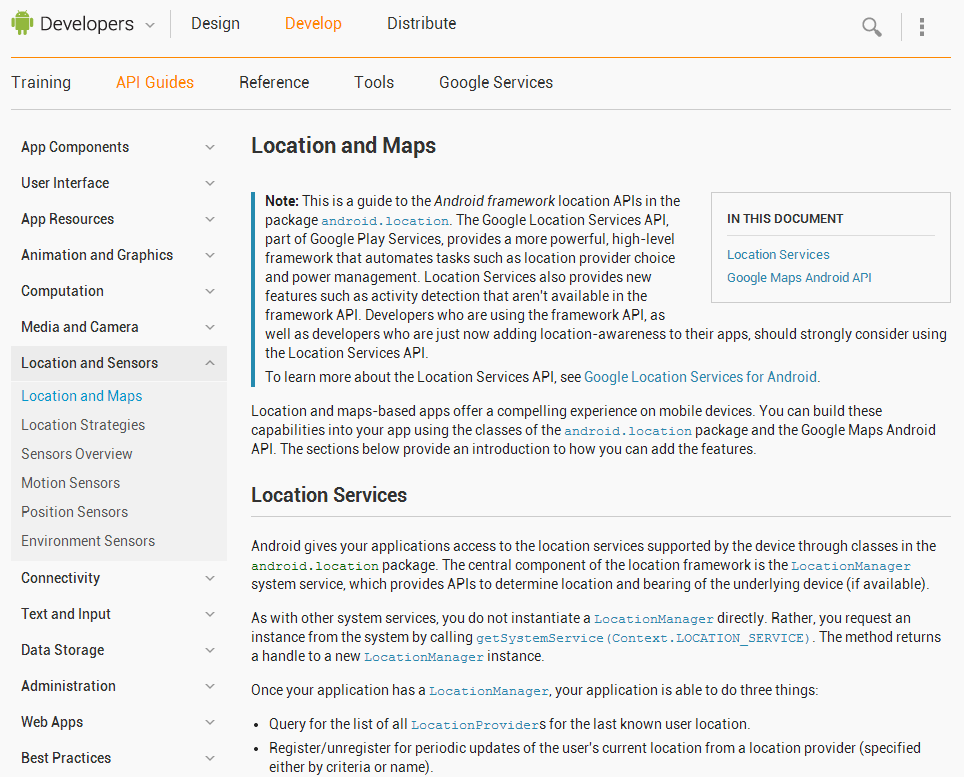

In principle, software development is quite comfortable for both platforms, if you do not encounter any problems. The QNX Momentics development environment resembles Eclipse and is only slightly inferior to Android Studio. In the case of mobile app development, the BlackBerry has a significant advantage: excellent wireless debugging tools and a faster emulator than Google’s. True, I lack the ability to view logs through logcat, implemented in Android.
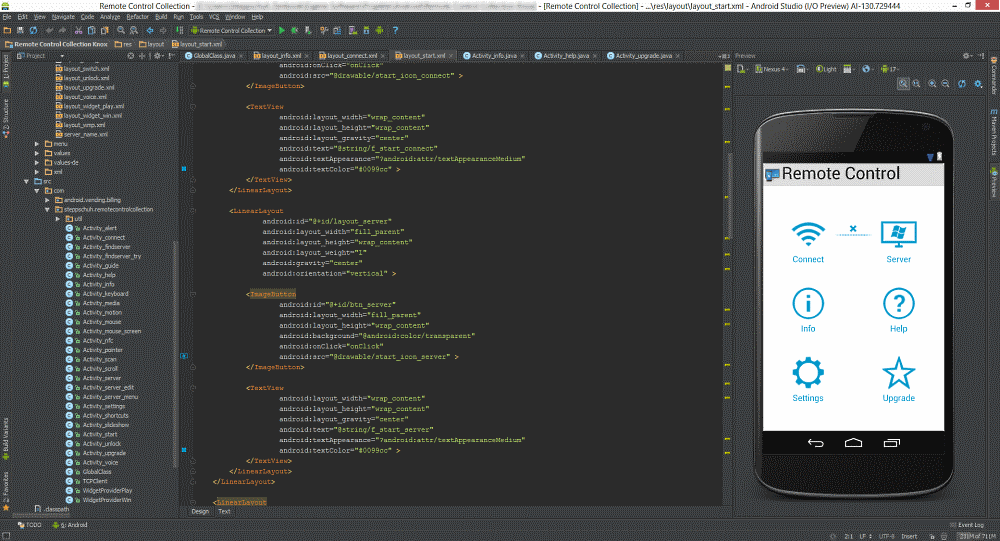
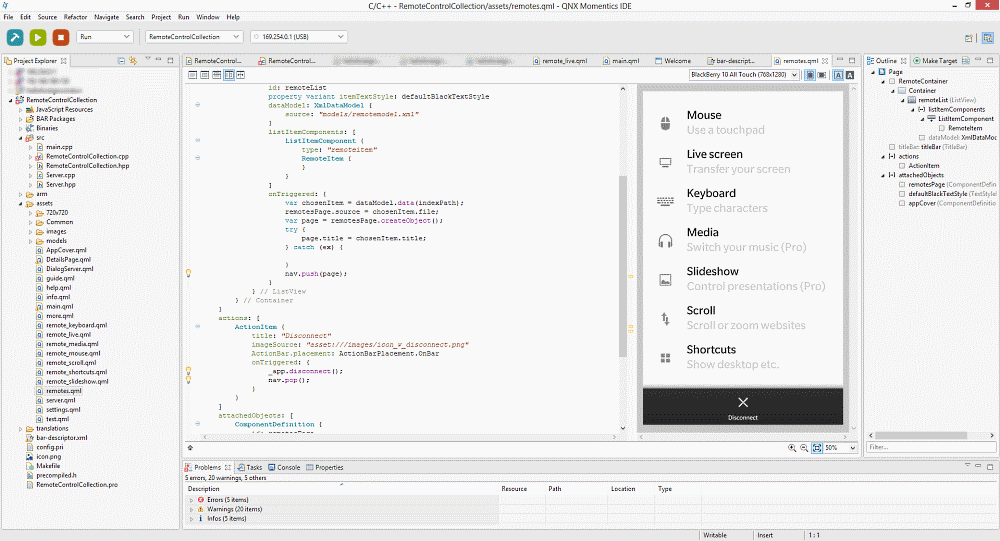
Publication
The first thing that, of course, is to make the developer - create an appropriate account. In the case of registration as an Android developer, Google will require $ 25 to verify your identity. Creating a similar account for BlackBerry for free. Unlike Apple, Google and BlackBerry do not require annual fees to renew registration.
Before publishing the application must be signed. Android uses a keystore for this, BlackBerry has its own keys. After the end of this procedure, you can create an entry in the app store.
Google provides the “Developer Console” for this purpose. Adding an application or updating it is quite simple, just as I expected. Changes take effect after 3-5 hours.
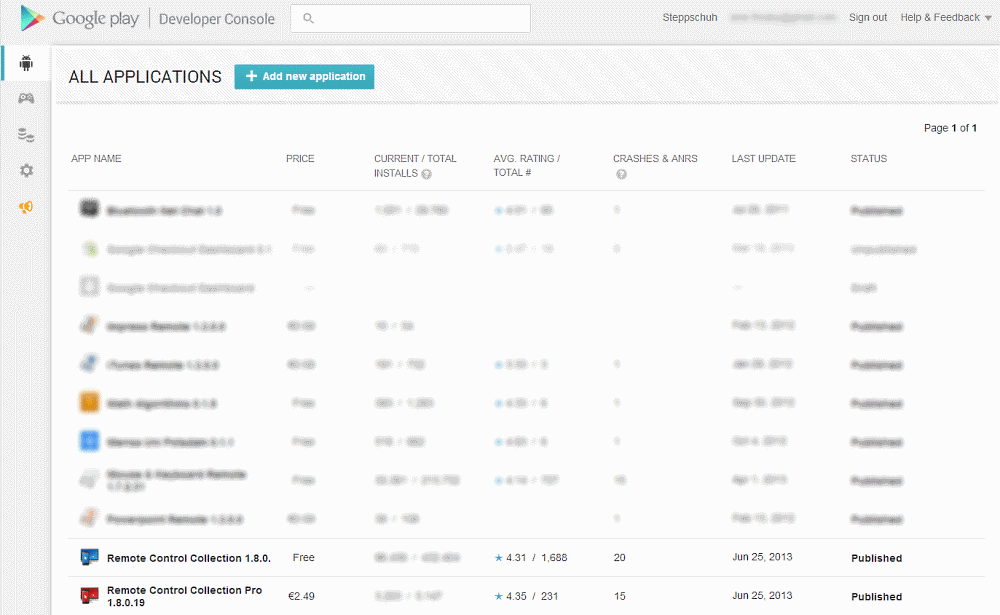
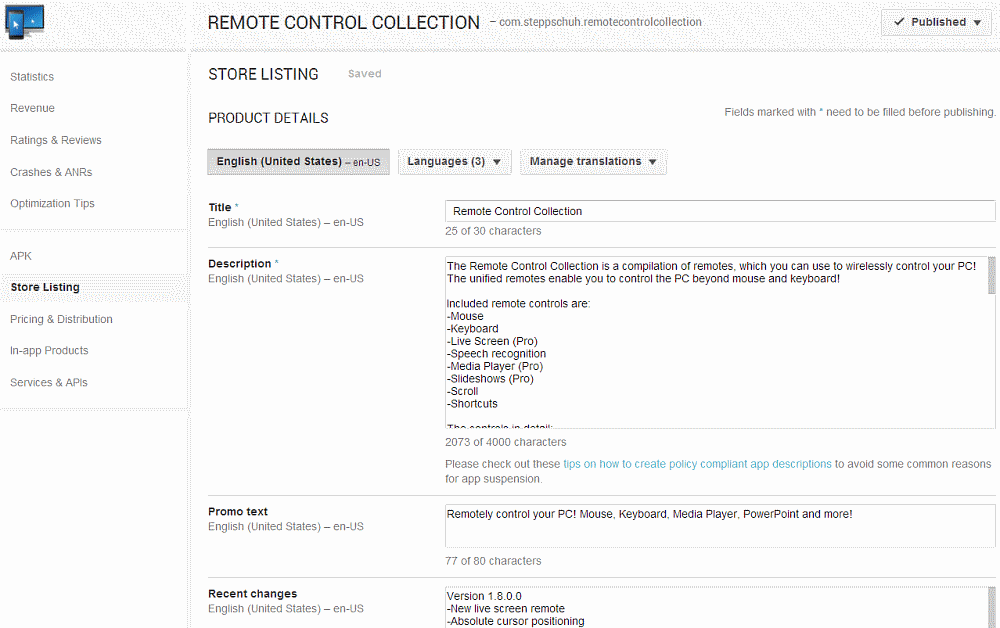
BlackBerry calls its system a “supplier portal” (Vendor Portal). Adding a new version of the application is rather inconvenient, but I’m already used to it. The main difference is the need to verify each release by employees of a Canadian company before it can be published. This feature is good for users, but it can annoy developers. I had a case where, as a result of a five-day test, I was refused only because the description contained the word “Android”.
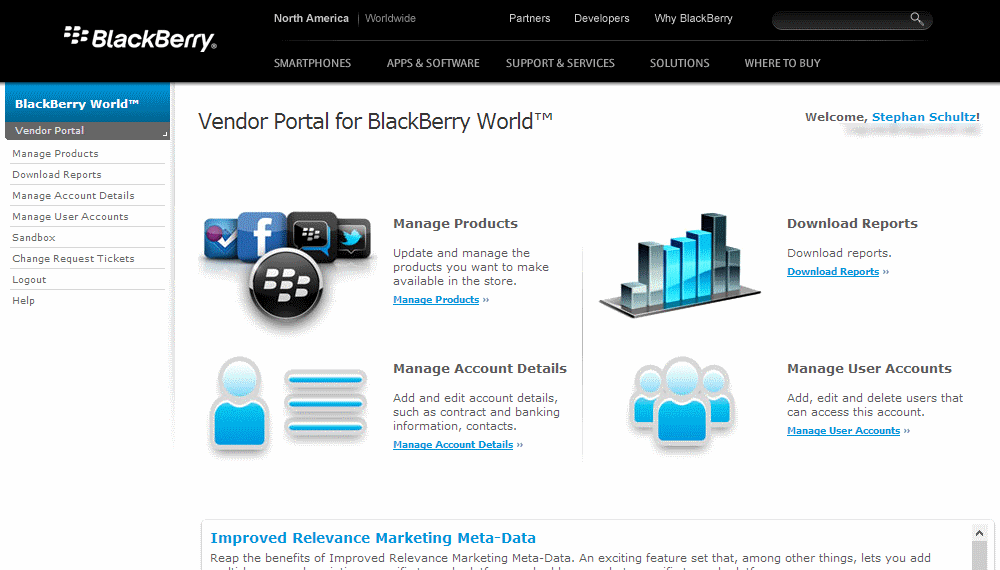
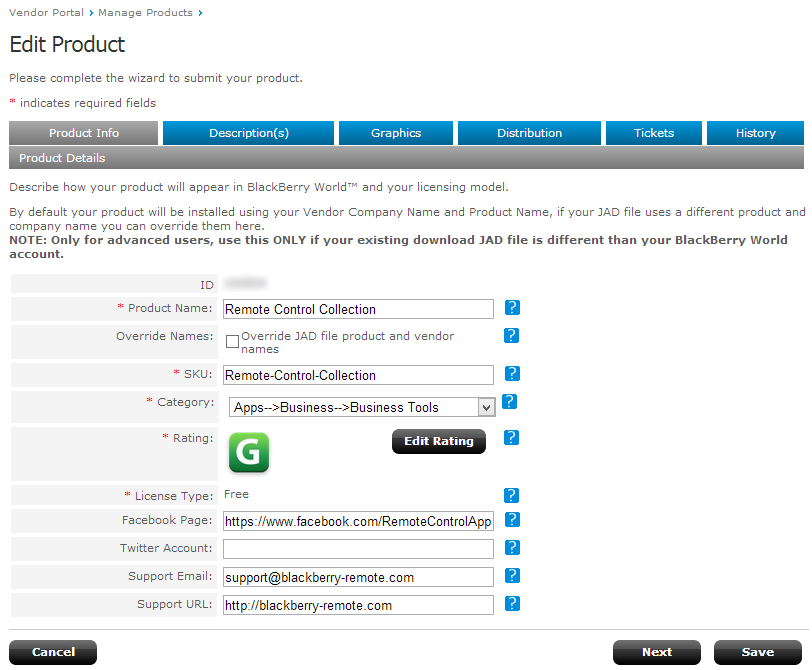
As the application becomes available to users, there are other differences. I want to focus on the system of comments / user reviews. Recently, Android allows a developer to respond directly to reviews. In addition, other users can rate comments as positive or negative, as well as mark them as spam.
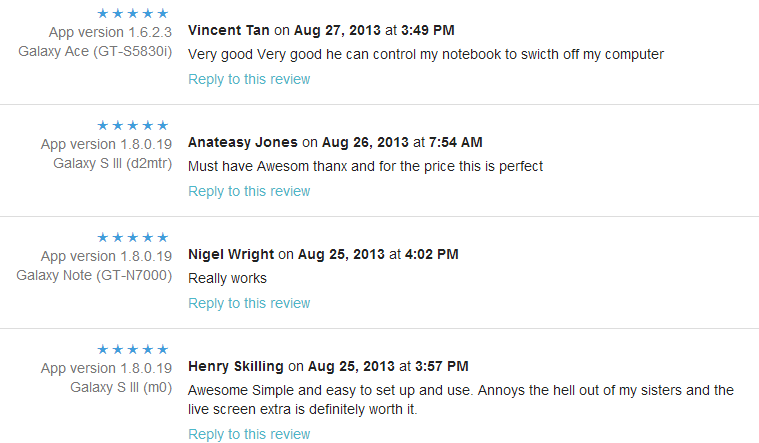
While the BlackBerry does not allow voting for comments, the developer can independently confirm or reject user feedback.
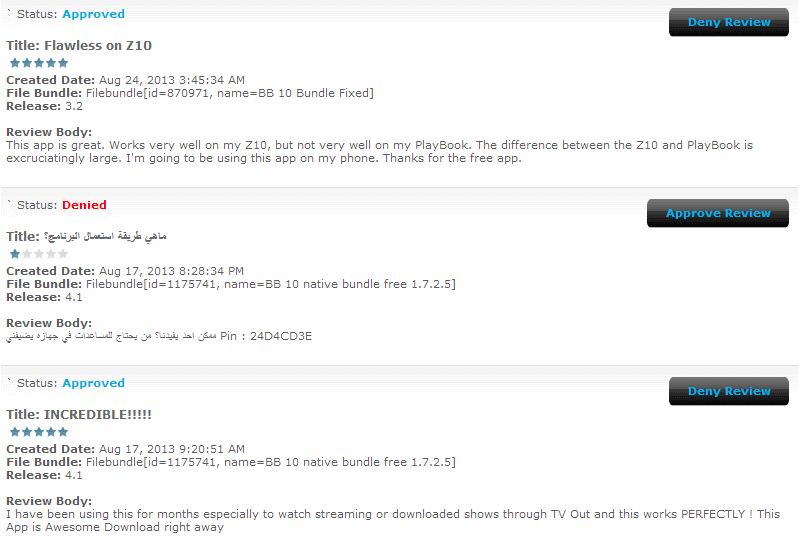
Analytics
Statistics is an important thing and both platforms provide this opportunity in their developer portals. Android statistics has been significantly improved since 2011 and today contains all the necessary information.

As for the BlackBerry, their analytics section has not been improved since 2012, when I first met it. Everything would be fine if it provided a comprehensive overview, but the graphics provided are hardly informative. Vendor can generate so-called "reports on downloads." I can set the start and end date, select the necessary applications and point to the display of downloads or purchases.
Here is a list of what I miss:
• Number of daily installs / deletions
• Total number of users
• Average rating
• OS version
• Application Version
• Device Model
• Bug reports
• Country and user language
• His age and gender
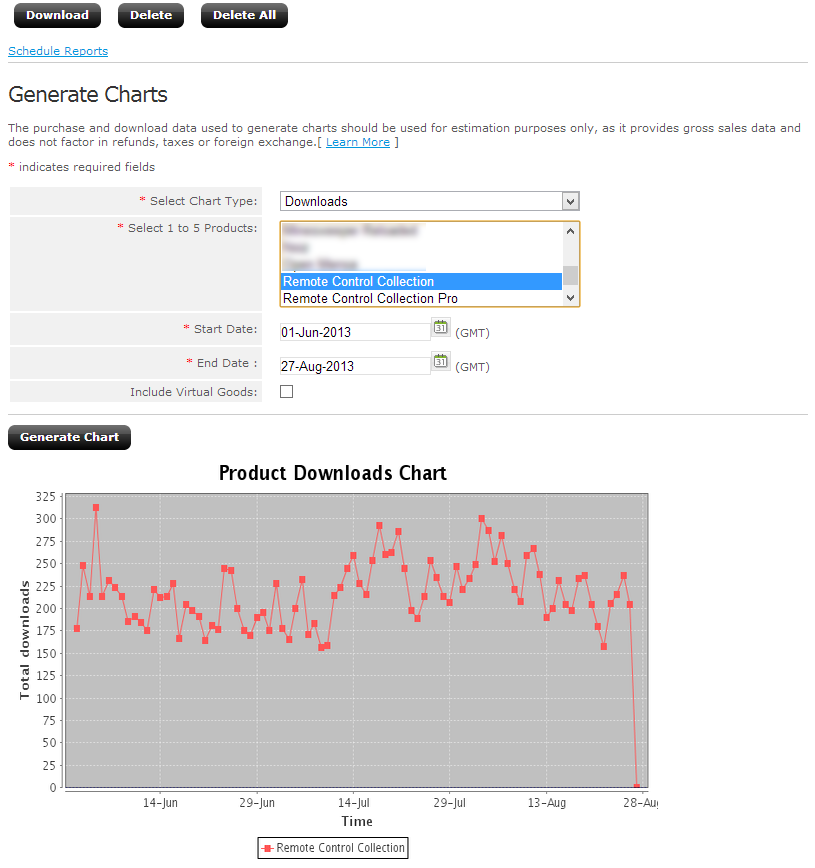
Profit
Both for Android and for BlackBerry, there are paid and free versions of the Remote Control Collection. The application contains the same features for both OS. The BlackBerry version has been featured (featured) in the BlackBerry World for three days. Android application of this advantage was not awarded even once. I understand that the comparison of absolute numbers is not very objective, because it does not take into account many factors that somehow affect the performance. I will not analyze anything, just want to give you an idea of my own results.
First I want to talk about the free version. Despite the fact that the user does not need to buy anything, it still brings me income. The application has no ads, but when installing the server for Windows, the user must visit the website of the program that contains the banner. Therefore, the number of users using the application for the first time is important for me, which in essence is the daily number of downloads.
• The average number of daily installations for BlackBerry is 250 downloads
• For Android, this parameter is equal to 4000 installations.
Users of the free version are the basis of those who subsequently pay for the Pro-version of the program, which, of course, generates more income than banner advertising. The BlackBerry app costs € 2.69, for Android - € 2.49. Like Google, BlackBerry takes 30% from each purchase. I do not want to publish my income here, but I will reveal the following:
• The highest profit per day for the BlackBerry version was € 80 (when the app was advertised in the featured category)
• For Android, this figure was 470 € (without getting into featured)
• For every 100 € from BlackBerry World, I get 4,000 € from sales on the Google Play Store
Below is a list of perceived merits that pushed me to the decision to start developing for BB10 (what I think now is indicated in brackets):
• Far fewer users (True)
• Users are much more likely to be ready to shop (Not in my case)
• Fewer competitors (True)
• The advantage of releasing the application at the same time as the release of BB10 (Not very important)
I do not want to discourage those who are planning to start developing for BlackBerry, I like this platform and the development of applications for it. I just hope that you will not have false hopes after making this decision.
Original translation: forums.crackberry.com/developers-lounge-f9/developing-blackberry-vs-android-843473
PS In order not to create a separate publication, I want to report on the next competition held by the BlackBerry. Recently, the company announced improvements to the Bilt for BlackBerry program. Among the innovations are “developer checklists” with a list of requirements for the application to meet this status, expansion of language support, a simplified process of sending software for review, as well as additional marketing opportunities in BlackBerry World. The first 250 developers who managed to hand over their game or application before October 21, 2013 and received Bilt for BlackBerry status will be awarded a red BlackBerry Z10. Read more here .
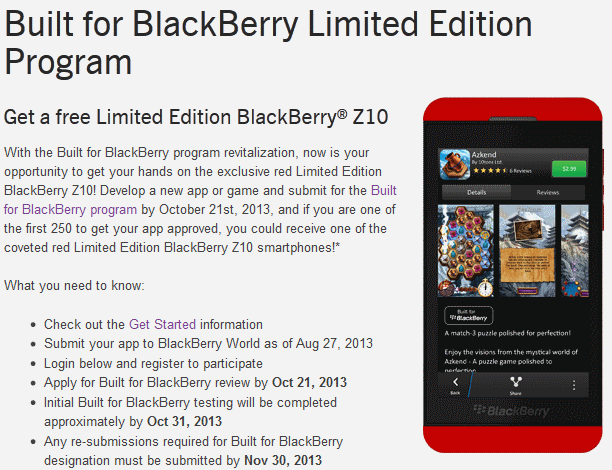

I want to share with you my own development experience for Android and BlackBerry. It will be not only about programming, but also about the analysis of statistics and profits.
')
I in no way want to judge the platforms, just sharing my impressions and facts.
About me
In order to better present the situation, I will briefly tell you about myself: I am 20 years old, I live in the city of Potsdam, Germany. At the moment I am studying at the Hasso Plattner Institute with a degree in Systems Engineering. I’m interested in Android development since 2011, and in 2012, BlackBerry was added to the list. That's when I started my own business. My main projects for BlackBerry are bb10bars.net and BB10 Sideloading Tool .
Comparison
As a basis for comparison, I will take my own Remote Control Collection application. This program for Android exists since November 2011. At the moment, it contains more features than the version for BlackBerry, so I will not use the most current version and statistics on it.
The Remote Control Collection for BlackBerry is a “native” application written using the Cascades framework, following all the guidelines of the Built for BlackBerry program. It is available from March 2013 and provides much better performance than the Android version. Prior to launching the BB10, the application was also available for the PlayBook tablet as an Android port.
Development
The first steps in programming for Android were pretty easy. Up to this point, I did not know Java, and I was not particularly familiar with Eclipse. A huge number of examples with source code allowed me to use almost any opportunity for my development. In the event of a problem, dozens of developers have already managed to discuss and solve it on StackOverflow before me.
When I started programming for BB10 using the first versions of the SDK and the DevAlpha device, I was aware that I could not count on a large amount of resources on this subject, as well as the developer community. The beta versions of the development environment were quite difficult to get to work correctly and most of the problems I had to solve myself. To date, everything has changed and the final versions of the SDK have the necessary stability. In addition, BlackBerry developer support forums provide help with the most common problems. Due to the lack of available source programs, it was quite difficult to start development, since the examples provided by a Canadian company can only be used for some cases.
Unfortunately, the API description and general BB10 documentation were just a joke compared to Android, BlackBerry will have to significantly improve it and it’s better not to delay the company.


In principle, software development is quite comfortable for both platforms, if you do not encounter any problems. The QNX Momentics development environment resembles Eclipse and is only slightly inferior to Android Studio. In the case of mobile app development, the BlackBerry has a significant advantage: excellent wireless debugging tools and a faster emulator than Google’s. True, I lack the ability to view logs through logcat, implemented in Android.


Publication
The first thing that, of course, is to make the developer - create an appropriate account. In the case of registration as an Android developer, Google will require $ 25 to verify your identity. Creating a similar account for BlackBerry for free. Unlike Apple, Google and BlackBerry do not require annual fees to renew registration.
Before publishing the application must be signed. Android uses a keystore for this, BlackBerry has its own keys. After the end of this procedure, you can create an entry in the app store.
Google provides the “Developer Console” for this purpose. Adding an application or updating it is quite simple, just as I expected. Changes take effect after 3-5 hours.


BlackBerry calls its system a “supplier portal” (Vendor Portal). Adding a new version of the application is rather inconvenient, but I’m already used to it. The main difference is the need to verify each release by employees of a Canadian company before it can be published. This feature is good for users, but it can annoy developers. I had a case where, as a result of a five-day test, I was refused only because the description contained the word “Android”.


As the application becomes available to users, there are other differences. I want to focus on the system of comments / user reviews. Recently, Android allows a developer to respond directly to reviews. In addition, other users can rate comments as positive or negative, as well as mark them as spam.

While the BlackBerry does not allow voting for comments, the developer can independently confirm or reject user feedback.

Analytics
Statistics is an important thing and both platforms provide this opportunity in their developer portals. Android statistics has been significantly improved since 2011 and today contains all the necessary information.

As for the BlackBerry, their analytics section has not been improved since 2012, when I first met it. Everything would be fine if it provided a comprehensive overview, but the graphics provided are hardly informative. Vendor can generate so-called "reports on downloads." I can set the start and end date, select the necessary applications and point to the display of downloads or purchases.
Here is a list of what I miss:
• Number of daily installs / deletions
• Total number of users
• Average rating
• OS version
• Application Version
• Device Model
• Bug reports
• Country and user language
• His age and gender

Profit
Both for Android and for BlackBerry, there are paid and free versions of the Remote Control Collection. The application contains the same features for both OS. The BlackBerry version has been featured (featured) in the BlackBerry World for three days. Android application of this advantage was not awarded even once. I understand that the comparison of absolute numbers is not very objective, because it does not take into account many factors that somehow affect the performance. I will not analyze anything, just want to give you an idea of my own results.
First I want to talk about the free version. Despite the fact that the user does not need to buy anything, it still brings me income. The application has no ads, but when installing the server for Windows, the user must visit the website of the program that contains the banner. Therefore, the number of users using the application for the first time is important for me, which in essence is the daily number of downloads.
• The average number of daily installations for BlackBerry is 250 downloads
• For Android, this parameter is equal to 4000 installations.
Users of the free version are the basis of those who subsequently pay for the Pro-version of the program, which, of course, generates more income than banner advertising. The BlackBerry app costs € 2.69, for Android - € 2.49. Like Google, BlackBerry takes 30% from each purchase. I do not want to publish my income here, but I will reveal the following:
• The highest profit per day for the BlackBerry version was € 80 (when the app was advertised in the featured category)
• For Android, this figure was 470 € (without getting into featured)
• For every 100 € from BlackBerry World, I get 4,000 € from sales on the Google Play Store
Below is a list of perceived merits that pushed me to the decision to start developing for BB10 (what I think now is indicated in brackets):
• Far fewer users (True)
• Users are much more likely to be ready to shop (Not in my case)
• Fewer competitors (True)
• The advantage of releasing the application at the same time as the release of BB10 (Not very important)
I do not want to discourage those who are planning to start developing for BlackBerry, I like this platform and the development of applications for it. I just hope that you will not have false hopes after making this decision.
Original translation: forums.crackberry.com/developers-lounge-f9/developing-blackberry-vs-android-843473
PS In order not to create a separate publication, I want to report on the next competition held by the BlackBerry. Recently, the company announced improvements to the Bilt for BlackBerry program. Among the innovations are “developer checklists” with a list of requirements for the application to meet this status, expansion of language support, a simplified process of sending software for review, as well as additional marketing opportunities in BlackBerry World. The first 250 developers who managed to hand over their game or application before October 21, 2013 and received Bilt for BlackBerry status will be awarded a red BlackBerry Z10. Read more here .

Source: https://habr.com/ru/post/191832/
All Articles